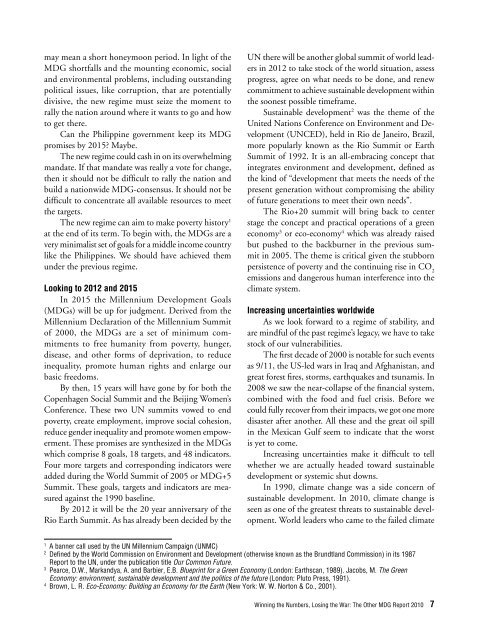Report - Social Watch Philippines
Report - Social Watch Philippines
Report - Social Watch Philippines
You also want an ePaper? Increase the reach of your titles
YUMPU automatically turns print PDFs into web optimized ePapers that Google loves.
may mean a short honeymoon period. In light of the<br />
MDG shortfalls and the mounting economic, social<br />
and environmental problems, including outstanding<br />
political issues, like corruption, that are potentially<br />
divisive, the new regime must seize the moment to<br />
rally the nation around where it wants to go and how<br />
to get there.<br />
Can the Philippine government keep its MDG<br />
promises by 2015? Maybe.<br />
The new regime could cash in on its overwhelming<br />
mandate. If that mandate was really a vote for change,<br />
then it should not be diffi cult to rally the nation and<br />
build a nationwide MDG-consensus. It should not be<br />
diffi cult to concentrate all available resources to meet<br />
the targets.<br />
The new regime can aim to make poverty history 1<br />
at the end of its term. To begin with, the MDGs are a<br />
very minimalist set of goals for a middle income country<br />
like the <strong>Philippines</strong>. We should have achieved them<br />
under the previous regime.<br />
Looking to 2012 and 2015<br />
In 2015 the Millennium Development Goals<br />
(MDGs) will be up for judgment. Derived from the<br />
Millennium Declaration of the Millennium Summit<br />
of 2000, the MDGs are a set of minimum commitments<br />
to free humanity from poverty, hunger,<br />
disease, and other forms of deprivation, to reduce<br />
inequality, promote human rights and enlarge our<br />
basic freedoms.<br />
By then, 15 years will have gone by for both the<br />
Copenhagen <strong>Social</strong> Summit and the Beijing Women’s<br />
Conference. These two UN summits vowed to end<br />
poverty, create employment, improve social cohesion,<br />
reduce gender inequality and promote women empowerment.<br />
These promises are synthesized in the MDGs<br />
which comprise 8 goals, 18 targets, and 48 indicators.<br />
Four more targets and corresponding indicators were<br />
added during the World Summit of 2005 or MDG+5<br />
Summit. These goals, targets and indicators are measured<br />
against the 1990 baseline.<br />
By 2012 it will be the 20 year anniversary of the<br />
Rio Earth Summit. As has already been decided by the<br />
UN there will be another global summit of world leaders<br />
in 2012 to take stock of the world situation, assess<br />
progress, agree on what needs to be done, and renew<br />
commitment to achieve sustainable development within<br />
the soonest possible timeframe.<br />
Sustainable development 2 was the theme of the<br />
United Nations Conference on Environment and Development<br />
(UNCED), held in Rio de Janeiro, Brazil,<br />
more popularly known as the Rio Summit or Earth<br />
Summit of 1992. It is an all-embracing concept that<br />
integrates environment and development, defi ned as<br />
the kind of “development that meets the needs of the<br />
present generation without compromising the ability<br />
of future generations to meet their own needs”.<br />
The Rio+20 summit will bring back to center<br />
stage the concept and practical operations of a green<br />
economy 3 or eco-economy 4 which was already raised<br />
but pushed to the backburner in the previous summit<br />
in 2005. The theme is critical given the stubborn<br />
persistence of poverty and the continuing rise in CO 2<br />
emissions and dangerous human interference into the<br />
climate system.<br />
Increasing uncertainties worldwide<br />
As we look forward to a regime of stability, and<br />
are mindful of the past regime’s legacy, we have to take<br />
stock of our vulnerabilities.<br />
The fi rst decade of 2000 is notable for such events<br />
as 9/11, the US-led wars in Iraq and Afghanistan, and<br />
great forest fi res, storms, earthquakes and tsunamis. In<br />
2008 we saw the near-collapse of the fi nancial system,<br />
combined with the food and fuel crisis. Before we<br />
could fully recover from their impacts, we got one more<br />
disaster after another. All these and the great oil spill<br />
in the Mexican Gulf seem to indicate that the worst<br />
is yet to come.<br />
Increasing uncertainties make it diffi cult to tell<br />
whether we are actually headed toward sustainable<br />
development or systemic shut downs.<br />
In 1990, climate change was a side concern of<br />
sustainable development. In 2010, climate change is<br />
seen as one of the greatest threats to sustainable development.<br />
World leaders who came to the failed climate<br />
1 A banner call used by the UN Millennium Campaign (UNMC)<br />
2 Defi ned by the World Commission on Environment and Development (otherwise known as the Brundtland Commission) in its 1987<br />
<strong>Report</strong> to the UN, under the publication title Our Common Future.<br />
3 Pearce, D.W., Markandya, A. and Barbier, E.B. Blueprint for a Green Economy (London: Earthscan, 1989). Jacobs, M. The Green<br />
Economy: environment, sustainable development and the politics of the future (London: Pluto Press, 1991).<br />
4 Brown, L. R. Eco-Economy: Building an Economy for the Earth (New York: W. W. Norton & Co., 2001).<br />
Winning the Numbers, Losing the War: The Other MDG <strong>Report</strong> 2010 7


